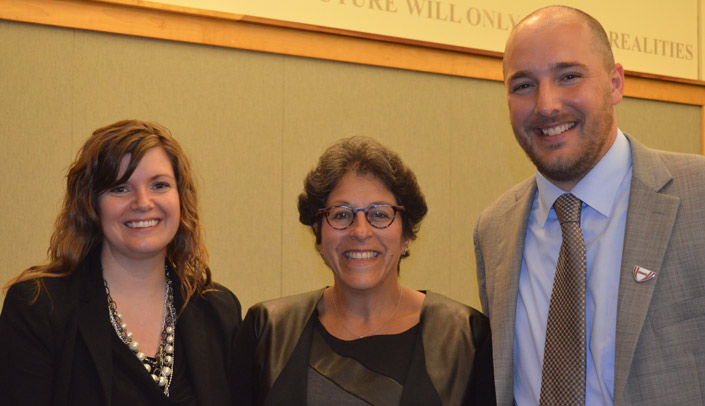To celebrate the beginning of its 10th year, the Great Plains Public Health Leadership Institute in UNMC’s College of Public Health welcomed back its founder, Magda Peck, Sc.D., to give the keynote address at the annual graduation ceremony in September.
What graduates are saying
Joseph Gaube, Douglas County Health Department, Retail Food, graduate of year nine: “As a new supervisor, the institute provided me the opportunity to self-reflect on what type of leader I want to become. We discussed different values and I chose courageous authenticity for my value. This is a wonderful program.”
Cathy Dillon, program manager, Nebraska Department of Health and Human Services, Life Span Health Unit, graduate of year six: “It’s great to meet new colleagues in public health in the state. We all look forward to coming to the institute, which allows us to build on existing networks and build working relationships with new people.”
Dr. Peck, who is now dean of the Joseph J. Zilber School of Public Health at the University of Wisconsin-Milwaukee, said she had no doubt the professional development program would make it 10 years.
She almost didn’t come as that also was the beginning of Rosh Hashanah, the Jewish New Year or the “Days of Awe,” and is normally spent with her family. Instead, Dr. Peck brought her family to Omaha so she could reflect “on the power of the new year.”
Dr. Peck described her journey through life as a series of themes at different ages. Her major theme up to age 30 was “Is it enough?” From age 30 to 60, her theme was “How can I be my most authentic self?”
Quoting the book, “Emotional Equations” by Chip Conley, “authenticity equals self-awareness times courage,” Dr. Peck said. “It takes courage to be the lone voice. In public health, we’re constantly redefining what’s not acceptable.”
One driver of excellence is curiosity. Another equation — “curiosity equals wonder plus awe. We’ve always asked questions people did not want asked,” she said.
Twenty-five scholars, the largest class so far, graduated from the ninth consecutive year of the program. Since 2005, the institute has trained 175 people from public and private organizations who work to improve the health and well-being of people and communities in Nebraska, Iowa, South Dakota and Kansas.
The graduates were recognized for their achievement at a luncheon attended by more than 100 regional leaders, family members, alumni and supporters.
Another record-setting class of 27 scholars was inducted for the 10th year of the institute.
The year-long institute is designed to build and enhance leadership skills for established and emerging leaders in the region’s public health systems.
The Leadership Institute is supported by funds from the federal Health Resources and Services Administration Bureau of Health Professions, the Nebraska Department of Health and Human Services, the Kansas Department of Health and Environment, and the UNMC College of Public Health.
For more information, contact Kathleen Brandert.
